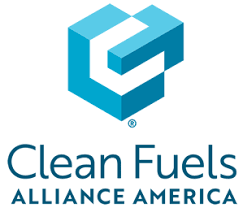INSIDE CFAA: Midwest Momentum

December 19, 2022
BY Clean Fuels Alliance America
This past year, states across the country continued to prioritize low-carbon renewable fuels like biodiesel, renewable diesel and sustainable aviation fuel. Clean Fuels Alliance America worked with state soybean organizations and member organizations to enact new laws that will set a path forward for additional growth in the biodiesel industry across the country’s Heartland.
Illinois started the momentum. In April, the Illinois legislature passed comprehensive revenue legislation, which included the expansion of its biodiesel sales tax exemption. Illinois currently provides an exemption on the sale of B10 sold at in-state fuel retail locations. This new legislation, championed by the Illinois Soybean Association, would enhance the program by applying the tax incentive to higher blends of biodiesel escalating over the coming years. Starting in 2024, the incentive would apply to blends of B13 and higher, increasing to B16, B19 and higher in subsequent years. It is expected to drive another 120 million gallons in biodiesel demand in the state.
In May, Iowa Gov. Kim Reynolds signed some of the most comprehensive state biofuels legislation in the nation. Backed by the Iowa Soybean Association, Iowa Biodiesel Board and others, the bill increased the state's biodiesel production tax credit from 2 cents to 4 cents per gallon while updating the state’s Renewable Fuel Infrastructure Program to increase access to higher blends of biofuels. The legislation maintains a biodiesel fuel tax differential by applying it to blends of B20, rather than B11. It extends current fuel retailer tax credits for B11 and higher, while introducing new credits for higher blends like B20 (7 cents per gallon) and even B30 (10 cents per gallon)—a national first.
In October, Clean Fuels joined Missouri Gov. Mike Parson as he signed legislation creating new incentives for the state’s biodiesel industry. Among other incentives, the law provides a 2-cent-per-gallon retail incentive for B5 to B10 and a five-cent-per-gallon retail incentive for B11-plus sold at Missouri fuel retailer locations. The bill also establishes a two-cent-per-gallon incentive for biodiesel produced in the state.
The success of these three states will have a huge impact on Midwest biodiesel demand. Combined, these new laws will grow biodiesel demand by 280 million gallons, and signal to other states that biodiesel is a worthwhile investment. For example, Michigan introduced legislation this past year that would incentivize biodiesel sales at in-state fuel locations. This legislation will be brought back in 2023 with hopes that it can receive strong support from lawmakers. Other states, like Nebraska and Indiana, are also deliberating what sort of biodiesel incentive package can be introduced, efforts being led by state soybean organizations with backing from Clean Fuels.
In addition to the success in the Midwest, Clean Fuels has been active in the Northeast and Mid-Atlantic states as well. Following up on industry-supported Bioheat fuel mandates that were adopted in New York, Connecticut and Rhode Island in 2021 (those states alone make up 40% of the heating oil market in the Northeast), Clean Fuels and other stakeholders have been pushing for California-like low carbon fuel standards (LCFS) for both heating and transportation fuels.
Following the loss (by one vote) of a Clean Heat Standard (an LCFS-like program for heating fuels) in the Vermont legislature this year, the same bill is expected to be reintroduced early in 2023 and easily pass. In these states and others, Clean Fuels has been working closely with marketers to advocate for policies that both reduce greenhouse gases and expand market share.
Advertisement
Advertisement
Related Stories
The biodiesel industry has been facing turbulence, but the release of long-overdue policy could course-correct.
The U.S. House of Representatives early on May 22 narrowly passed a reconciliation bill that includes provisions updating and extending the 45Z clean fuel production tax credit. The bill, H.R. 1, will now be considered by the U.S. Senate.
U.S. EPA Administrator Lee Zeldin on May 21 stressed the agency is working “as fast as humanly possible” to finalize a rulemaking setting 2026 RFS RVOs during a hearing held by the U.S. Senate Committee on Environment and Public Works.
Clean Fuels Alliance America on May 22 delivered a letter to U.S. EPA Administrator Lee Zeldin, urging him to set the 2026 RFS biomass-based diesel volume at no less than 5.25 billion gallons and allow continued growth in the 2027 volumes.
A group of 28 House members on May 16 sent a letter to President Donald Trump urging his administration to adopt timely, robust Renewable Fuel Standard renewable volume obligations (RVOs) for 2026 and beyond.
Upcoming Events










